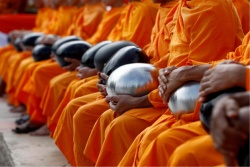Difference between revisions of "What is the meaning of giving food to the monks?"
(Created page with "thumb|250px| As regards the giving of food to the monks, some people doubt whether that is of any use. They are inclined to think...") |
|||
| Line 1: | Line 1: | ||
[[File:Buddhist-monks25.jpg|thumb|250px|]] | [[File:Buddhist-monks25.jpg|thumb|250px|]] | ||
| − | As regards the giving of [[food]] to the [[monks]], some [[people]] [[doubt]] whether that is of any use. They are inclined to think | + | As regards the giving of [[food]] to the [[monks]], some [[people]] [[doubt]] whether that is of any use. They are inclined to think that [[monks]] want to have an easy [[life]] and that they do not have to work at all, but they forget that the {{Wiki|real}} meaning of {{Wiki|being}} a [[monk]] is seeking the [[truth]]. A [[monk’s]] [[life]] is a hard [[life]], he does not have a family [[life]], he |
| − | cannot choose his own [[food]] and he does not take part in any entertainment such as going to the movies or football matches.He renounces the luxuries of a home, entertainment, choice | + | cannot choose his own [[food]] and he does not take part in any entertainment such as going to the movies or football matches.He renounces the luxuries of a home, entertainment, choice of clothing and [[food]], in [[order]] to seek the [[truth]] and to help other [[people]] to find the [[truth]] as well. |
| − | When [[people]] give [[food]] to the [[monks]] their act is one which | + | When [[people]] give [[food]] to the [[monks]] their act is one which will be fruitful for both parties. The giver will {{Wiki|benefit}} from his act because he has a [[wholesome]] [[mental state]] at the [[time]] of giving:when there is [[generosity]] there is no [[greed]] or [[attachment]]. The receiver will {{Wiki|benefit}} from the act of the giver because he is encouraged to study and practice the [[Buddhist teachings]] more earnestly and to help other [[people]] to know the teachings as well.He [[knows]] that the [[food]] he receives puts him under an obligation to be [[worthy]] of the [[gift]], to work for the [[spiritual]] welfare of the whole [[world]]. [[Monks]] are continually reminded of their responsibility as [[monks]], and twice a month they recite the rules of “Påìimokkha”in which their obligations are summed up. Furthermore, when the receiver is aware of the [[wholesome]] state of the giver, he will rejoice in the [[good deeds]] of the giver and thus he will have a [[wholesome]] [[mental state]] as well; he will be inspired by the [[generosity]] of the giver. |
{{R}} | {{R}} | ||
[http://bodhikaram.blogspot.com.au/2010/10/what-is-meaning-of-giving-food-to-monks.html bodhikaram.blogspot.com.au] | [http://bodhikaram.blogspot.com.au/2010/10/what-is-meaning-of-giving-food-to-monks.html bodhikaram.blogspot.com.au] | ||
[[Category:Sangha]] | [[Category:Sangha]] | ||
Revision as of 16:09, 24 September 2013
As regards the giving of food to the monks, some people doubt whether that is of any use. They are inclined to think that monks want to have an easy life and that they do not have to work at all, but they forget that the real meaning of being a monk is seeking the truth. A monk’s life is a hard life, he does not have a family life, he cannot choose his own food and he does not take part in any entertainment such as going to the movies or football matches.He renounces the luxuries of a home, entertainment, choice of clothing and food, in order to seek the truth and to help other people to find the truth as well.
When people give food to the monks their act is one which will be fruitful for both parties. The giver will benefit from his act because he has a wholesome mental state at the time of giving:when there is generosity there is no greed or attachment. The receiver will benefit from the act of the giver because he is encouraged to study and practice the Buddhist teachings more earnestly and to help other people to know the teachings as well.He knows that the food he receives puts him under an obligation to be worthy of the gift, to work for the spiritual welfare of the whole world. Monks are continually reminded of their responsibility as monks, and twice a month they recite the rules of “Påìimokkha”in which their obligations are summed up. Furthermore, when the receiver is aware of the wholesome state of the giver, he will rejoice in the good deeds of the giver and thus he will have a wholesome mental state as well; he will be inspired by the generosity of the giver.
